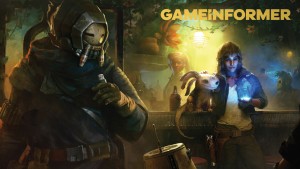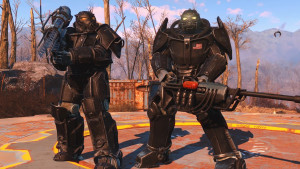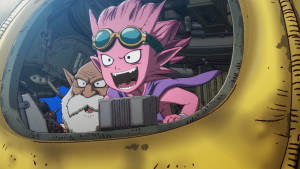Please support Game Informer. Print magazine subscriptions are less than $2 per issue
Why 1979 Revolution: Black Friday Is Worth Your Time

I recently played through 1979 Revolution: Black Friday and found it to be an intriguing adventure that borrows heavily from the Telltale gameplay model, where players determine how a story plays out by participating in dialogue scenes and making difficult choices. Situated in the 1979 revolution in Iran, the game lets you live out this scenario to see how it affects the protagonist and the lives of others. 1979 Revolution takes place during the few days leading up to the infamous Black Friday, an event that saw nearly a hundred protesters killed by the Iranian army on the streets of Iran's capital, Tehran.
Creator Navid Khonsari lived through the revolution when he was young, and 1979 Revolution is based on several interviews, eye witness accounts, and real people, tapping into the lesser known genre of video game documentaries. In Iran, the game has since been branded as pro-Western propaganda by the media, and Khonsari fears he may not be able to return to his home country. You can read my review here, but fellow editor Elise Favis and I wanted to do a bit of a deeper dive and talk about what’s so interesting about this interactive adventure.
Javy Gwaltney (J): So Elise, you just finished 1979 Revolution: Black Friday, right? What did you think about it?
Elise Favis (E): I thought it was a neat approach to storytelling, particularly for a documentary. I had known only the bare minimum about Iran’s revolution before playing, and while this game is only around two hours long, it expanded my knowledge about the event for sure. Playing as Reza, an aspiring photojournalist who had been abroad for a year, worked really well because he knew little about the revolution like I did, and it didn’t break immersion. So learning about the tumultuous circumstances in Tehran through his eyes worked really well for me, though I did have some issues with the gameplay. How was your experience with the game, Javy?
J: Same page, pretty much. I really like Reza as a protagonist, especially in the sense that he’s a pretty privileged dude, having been to other countries, and that status results in resentment from the people around him. The rest of the cast is pretty well developed too, all of their perspectives are understandable and logical in the context of who they are and where they come from. That’s difficult for a lot of narrative-focused games to pull off, and it does it well enough that I played through the entirety of the experience genuinely curious and sometimes excited to see what was coming next. But yeah, that gameplay, hoo boy. It is a Thing.
E: Yup, the cast is full of colorful characters. What I liked most was the contrast between some of them, such as Reza’s best friend Babak being more of a pacifist, while Reza’s cousin Ali thought change could only come through violence. None of the characters felt helpless, and even some of the “oppressors” seemed to have their own reasons for their actions, potentially acting out of fear like Reza’s brother Hossein who is a cop. But yeah, outside of the narrative, the gameplay really poses some big problems. Just like many other modern adventure games, 1979 Revolution puts emphasis on quick-time action events, and while we’ve seen these executed well in some Telltale titles for example, I often felt like these were forced, contrived, and there to amp up the action when it wasn’t even necessary. I wonder if the game would have been better without them.
J: Yep, the biggest problem with these quick-time sequences isn’t that they look dumb and are shoddy and annoying to play through (they are all of these things, by the by) but because of just how contrived they are. There is literally a situation in the game where some punks show up out of nowhere and get aggressive with Reza just for the sake of having a dramatic action sequence. It’s shoehorned in a way that suggests a lack of confidence on the part of the developers that these tense conversations, with characters fiercely arguing about their political views and philosophies, can’t stand on their own. It’s the same thing that happened with Soma, with monsters distracting from the true, existential horror of the game. And it’s such a shame because 1979 Revolution does genuinely interesting things with its historical setting and its well-developed characters. I really resent this notion that an adventure game is not an adventure game if it doesn’t have some sort of physical excitement to it, like people beating each other up or bullets flying everywhere, and these sequences embody that sort of medium anxiety, I’d say. How did you feel about the edutainment bits of the game, with you able to pick up objects like photographs or letters and be given historical context about the revolution itself?
E: In terms of the educational tidbits, I thought those were great mostly. Using Reza’s camera to photograph different scenes, from a mother cradling her baby on the side of the road to a mass crowd of people praying, was fantastic, especially because each photo you take is then juxtaposed with an actual archival photo from these real-life events. I did find the camera became a bit of a tired mechanic after being overused so much though, but the glossary that you can look through at any time to understand more of the historical context added a lot of substance. For example, during one of the early flashforwards where Reza is tortured at the Evin Prison, the interrogator offers him tea, and you can refuse or accept this gesture. I didn’t think much of it at first, but reading through the glossary later I learned that offering Iranian tea is a cultural gesture of hospitality, and it’s rude to refuse when you’re a “guest.” It added a whole layer of meaning to that scene for me. Speaking of those interrogation scenes, which reminded me a lot of The Witcher 2’s opening, did you find that was a good way to help present and weave the narrative?
J: Yeah, it was a reliable backbone for the game, I think. It did get kind of predictable though, with every flashforward to that sequence ultimately ending in Reza getting beaten on or electrocuted while the interrogator yells at him. But it was a good way to form bridges to the other important story points in a dramatic fashion. I still think the most interesting points of the game have nothing to do with explicit violence but instead the clashing of ideas. It’s the kind of conflict we don’t see much of in games since most philosophical clashes usually take on the appearance of two sides going up against one another on a battlefield. But so much of what makes 1979 work is the majority of it is just comprised of people talking, sometimes jovially, sometimes passionately, and it’s somehow very mundane and exhilarating at the same time. And I think that’s ultimately what sets the game apart at this moment in time: it’s doggedly intellectual with surprisingly few compromises, and manages to combine drama and history and toe the line between edutainment and thriller in an impressive manner. I hope to see more narrative-focused games take creative risks, like having a setting that’s not marketable or not courting melodrama when it’s easy to, that Ink Studios has taken with this game.

E: Definitely one of 1979’s most striking elements is that Ink Studios doesn’t dumb down the game at all. My favorite parts were also during those more “banal” moments of just overhearing conversations, or roaming an area to read pamphlets or listen to tapes that were used to promote the revolution. I loved how I had the choice to listen to those in either English or Farsi. 1979 Revolution is best with its visual narratives and spatial storytelling; when action is at its lowest. Another thing that struck me was the positive portrayal of Muslim people, especially considering the amount of prejudice that group faces nowadays. Reza evidently has faith like many of the other characters, and playing as him was a refreshing and fascinating experience. There’s one point where you are asked to join in prayer – you can refuse or accept – and so I joined in. By the end of it, the characters remark how peaceful it is, and that their faith can only be completed once they love another. That’s not something you hear often in a video game, or in media lately to boot, considering the large misconceptions we see about Muslims today. Choosing to join prayer or not was one of the minor choices in the game. How did you find choice and consequence were handled?
J: I thought the illusion of choice is strong. I’ve only played through it once so I have no idea if my choices actually matter in the sense that choice B would lead to a very different place than choice A in any given situation. Still, I experienced moments of regret and panic over several choices I made in the game and really, that’s the measure when it comes to these sorts of games, isn’t it? How strong the illusion of choice is – how those decisions and consequences make you feel and not necessarily how many branching paths there are and where they all lead. Like most adventure games, 1979 Revolution is about the journey and not the destination, and it’s a fascinating one I’ll likely remember for a long time to come, quick-time warts and all.
E: 1979 Revolution has its flaws, but I’m in the same boat. I thoroughly enjoyed my time with it, especially with its cultural influences. The way they were presented reminded me a bit of the platformer Never Alone, except this time it’s not folklore – it’s real events and real eyewitness stories brought to life virtually. It may have its rough edges, but 1979 Revolution is by all means a game that everyone should play.










